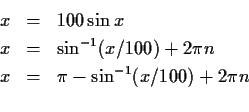Consider the equation
![]() .
Providing for all solutions of
.
Providing for all solutions of ![]() yields three iterators:
yields three iterators:

Furthermore, all solutions can be generated by simply using different
values of n.
For the first equation, values
![]() will yield the even
numbered roots, whereas values
will yield the even
numbered roots, whereas values
![]() will yield the
remaining roots when used in the second equation.
Other values of n diverge.
(The asymmetry comes from the positive sign on the first
will yield the
remaining roots when used in the second equation.
Other values of n diverge.
(The asymmetry comes from the positive sign on the first
![]() ;
the iterator
;
the iterator
![]() would supply the same set of roots with
would supply the same set of roots with
![]() ).
The solution obtained is unrelated to the initial guess used;
almost any starting value acceptable to the
).
The solution obtained is unrelated to the initial guess used;
almost any starting value acceptable to the ![]() converges to the
same root for a given choice of iterator and n.
converges to the
same root for a given choice of iterator and n.